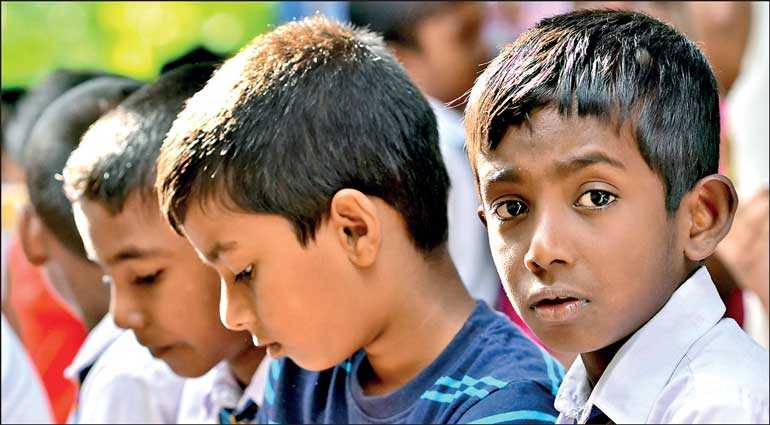Tuesday Feb 17, 2026
Tuesday Feb 17, 2026
Friday, 29 March 2019 00:00 - - {{hitsCtrl.values.hits}}

The President has made headlines declaring an intention by the Government to abolish the Grade Five Scholarship examination. The President is free to express his opinions but policy making has to be led by the Minister of Education and ratified by the Cabinet. 
Besides, the President’s call to abolish the scholarship exam is misguided, I believe.
My observations are based on the results of an action research that we carried out in 2012-2014 period on a holistic education process tested in Ampara education zone, and reports of committees of experts in some of which committees I had the opportunity to participate.
The holistic education initiative in Ampara education zone was led by then Minister of Education for the Eastern Province, but unfortunately the minister lost his portfolio before we could institutionalise the innovations through policy changes at national level. One important lesson we learned is that innovations in education will not succeed without changes to the examination system. In that regard, the present discussion on Grade Five Scholarship Examination is a welcome development.
The Grade Five exam with its imperfections is still a useful mechanism to level the playing field in an inequitable education system which cannot be reformed anytime soon. Succeeding governments to their credit have made efforts, and continue to make efforts, to remove inequities through various initiatives, which are more or less similar but implemented under different names such as Navodya Schools, Isuru Schools, Thousand Schools and now as the Nearest School is the Best School. Education is not an island. It reflects inequities in society. Reforms take time. In the meantime parents will find ways through bribes or whatever means to get children into popular schools, with or without the scholarship exams.
Families in Sri Lanka organise their lives around the schedules of the three national examinations. Of these, the grade five scholarship examination is the most controversial because of the pressure it puts on small children. Those who score above a certain cut off mark in the exam get to attend popular schools. Though these schools typically pack 50 or more students to a class, they are in high demand for extra-curricular reasons. The intangible benefit of getting a child into a privileged group of parents and students is sure to be on the backs of the parents’ minds.
The harmful effects of the present exam on children at an individual level and its adverse impact on the teaching and learning process as a whole are well documented. But such competitive exams are not limited to Sri Lanka. Scholarship examinations similar to ours in purpose are held in Australia (Year-7 Test), Singapore (PSLE) and UK (11-Plus), for example. The Singapore PSLE is a particularly demanding one because children are streamed into fast-track academic, regular academic or technical tracks based on the examination results. The pressure on children is said to be immense and authorities continue to modify the examination.
However, by all accounts these other examinations do not seem to distort the educational process as in Sri Lanka. Therefore, we should look for ways not to abolish the exam, but to improve it after studying the form and content of testing used in Singapore and other countries.
Currently the scholarship exam consists of two papers each of one hour and 15 minutes duration. Paper I is a general intelligence test and Paper II is a test of attainment of all material covered in the syllabus. I propose that the objectives of the exam should be articulated to include (1) identifying gifted students (2) assessing the attainment of essential competencies of all students and (3) identifying schools that fail to equip all their students with essential competencies. These steps or similar would make the examination a smarter one that achieves national objectives without hurting the teaching learning process or the development of primary school age children. Following are some proposals for consideration:
Do away with Paper II that tests subject knowledge
The Grade 5 Scholarship Examination which began as an IQ test became an examination that tested knowledge, because it was felt that teachers were not covering the subjects properly. The testing of subject knowledge is the origin of rote learning and unnecessary pressure on children.
Primary curriculum includes four main subjects which are Language, Math, Religion and Environment. In Grades 1 and 2, education is expected to be mostly play-based, with the pen and pencil components increasing significantly only in Grade 5. Activity-based learning is central to all grades. The Environment subject consisting of units such as Our Garden, The Animals around Us, the Sky, and Water, etc. is particularly amenable to activity-based student-centred learning.
However, the inclusion of subject knowledge in the scholarship exam has turned learning into a process of absorbing a heap of facts based on past papers. For example, in the course unit, ‘trees around us’ the child is expected to ‘explore and appreciate’ the tress around him/her. A scholarship examination guide book released recently with past question papers from 2000-2016 had questions regarding over 100 species of plants – the shape of their branches, flowers and about their propagation. Imagine a child preparing for the examination without knowing which property of which tree will be tested on the big day. In effect, preparing for the scholarship examination means covering an unauthorised curriculum based on past papers.
In response, the teachers are setting aside teacher guides and using ‘sets’ or ‘kattala’ of past papers to drill the students on ‘correct’ answers. Tuition masters do that better for a fee. In order to change this tragic system we propose to remove the testing the subject knowledge from the scholarship examination and restricting subject knowledge to school-based formative assessment and evaluations.
To ensure that teachers do indeed cover the subjects, we propose that school-based assessments should be checked for ‘completion or not’ for those securing cut-off mark at the exam.
Sharpen Paper I to select gifted children
The stated objective of the scholarship exam is to select students of higher cognitive ability and give them scholarships to attend a school of their choosing. In an article published a year before her death in 2017, Dr. Thilokasundari Kariyawasam noted that the design of the present exam is far from scientific and not sufficiently discriminatory to identify the truly gifted students and she advocated getting foreign expertise to design a better exam. Since then the design of the exam may have improved.
Introduce an essential competency component
The Primary education curriculum identifies 55 competencies that need to be inculcated in a child completing Year 5. First 23 of these competencies literacy with listening, speaking comprehension and writing as well competencies and numeracy with mathematical concepts, graphing, identifying patterns and interpreting included. Schools are responsible for ensuring that each and every child possesses minimum achievements in these 55 competences, but currently, they are simply a list of items to be ticked off casually. In-Service-Advisors (or ISAs) are required to monitor but the process is ad hoc.
Overall incentives in schools are biased towards schools that focus on winning horses, claiming winners and receiving publicity. This is a wasteful exercise. The number of gifted children in a school is largely a random occurrence. Children succeed not because of schools but their innate ability and the extent of coaching received.
A focus on essential competencies will get schools back on track. A test of essential competencies can be an exam carried out by each province. It can be used as a screening test for the scholarship exam by including few additional challenging questions. The papers need to be moderated by cross-province panel that incudes national representatives.
Alternatively, essential competencies can be tested as a compulsory Paper I in the present scholarship examination with an intelligence test designed to select gifted students being an optional Paper II.
Rank the schools not the children
Currently the aftermath of the scholarship exam is an occasion for a media circus with children, their parents and teachers serving to fill space on newspapers for lazy journalists. These news stories send the wrong message to majority of children that only exam success matters and they are not good enough. Also schools that do not give essential competencies to all children get off the hook while a few achievers go on parade.
It is neither psychologically or socially appropriate to rank children of primary school age or a more productive exercise would be to rank the schools based on percent of students achieving essential competencies in language and math, respectively.
Increase merit-based admissions to popular schools
Although the ministry lists 212 or so schools as popular schools, each offers only 1-3 classes to scholarship-based admissions. For example, of the 10 or more parallel classes in Grade 6 at Royal College or Vishaka Vidyalaya, only three are open to scholarship students. More classes should be opened eventually turning some of these to national schools with residential facilities dedicated to gifted children from across the country. But in the short terms it would be unwise to disturb the present eco-system too much. The popularity of these schools is based on the additional resources afforded by wealthier or more influential parents or past pupils of these schools and social networks they represent.
Nearest school best school
When we did a study in 2007, the number of popular schools listed by the Ministry of Education was only 107 covering only one third of the 93 educational zones. The number has almost doubled by 2018 and the coverage of zones too has increased. But the actual quality of these schools needs to be assessed and publicised.
Base all decisions on evidence
Policy decisions are typically made in top down mode using opinions of experts. Whatever the opinions of the experts, proposed changes should be tested on a random sample of students and teachers or at least a suitable focus groups of each. As Dr. Kariyawasam advised, the format of the scholarship exam should be tested rigorously for its efficacy to identify the most gifted. The essential competency component should be designed such that the tests don’t harm the play-centred education recommended for primary school children.